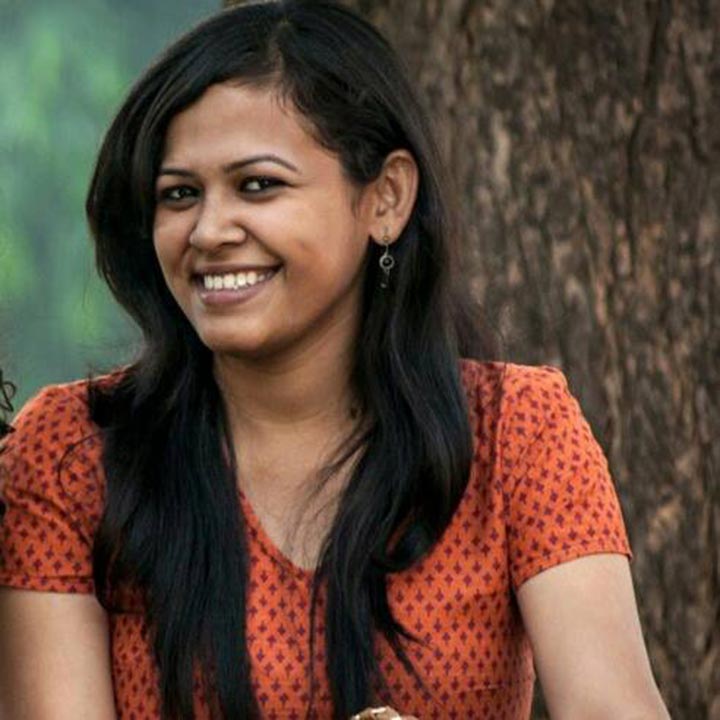Esha graduated from WBNUJS, Kolkata in 2012, instead of applying for mainstream corporate jobs, or pursuing a career in litigation, she applied for jobs in the legal journalism. She worked at Bloomberg as an anchor for quite a span of time, and is currently an associate at Dua Associates. Let’s talk with her about her experience in the legal journalism sector.
Most of our readers are law students and lawyers. How will you introduce yourself to them?
An apt introduction would be law student turned journalist turned advocate.
Please tell us something about your college life. Why did you want to study law?
I was preparing for medical entrances, but a lack of interest in science made me give that up. I saw the law school entrance question papers and an aptitude based test seemed like an interesting option 🙂 Law is very logical, and that was the first thing which drew me towards it.
I graduated from National University of Juridical Sciences, Kolkata. The five years spent in NUJS and Kolkata was truly an experience. Apart from academics, which of course is the staple of any college life, a good circle of friends, and gaining the independence to do what I wanted to do is what I give the college credit for.
When you were in college, what were your thoughts on career? What kind of internships did you do?
When I first came to college, becoming a corporate lawyer was the thing everyone aspired for, and naturally, I believed in the same. Gradually, I started questioning whethercorporate law was what I wanted to do. The bad thing was I had very little idea about the other options I had. The good thing was lot of seniors from NUJS, even current students had started exploring new career options, which took off some pressure from me.
My internships were varied. It was a conscious decision to work with as many diverse organizations as I could manage, to gain perspective on my career options. I interned with Down to Earth magazine (the flagship bi monthly magazine by Centre of Science and Environment) where I wrote for them for two months, litigating lawyers, a multinational company, Jharkhand State Electricity Board (to gain some experience with a government body), a boutique IP firm and of course the customary top corporate law firms.
You worked with Bloomberg TV India after graduation. Don’t you think this is an unusual career choice for a law graduate?
I would say it is not the usual career choice for a graduate from a five year law school. Legal journalism is an option many students from 3 year law colleges, especially CLC opt for. A major chunk of journalists who report from Supreme Court and High Courts are law graduates since they are supposed to be equipped to understand the legal jargons and give a clear understanding of what the Court said in a particular matter. Also, a court accredited journalist needs to have a law degree. So it is not an unusual choice per se. I was interested in journalism from the beginning because of my interest in writing. I worked with and ran the in house NUJS magazine, Writer’s Block for some time. Working with Down to Earth magazine gave me an understanding of print media. But yes, working with a TV channel was entirely a different ball game altogether.
 What motivated or encouraged you to join Bloomberg? Was this a campus placement? Did you consider other media companies at that time?
What motivated or encouraged you to join Bloomberg? Was this a campus placement? Did you consider other media companies at that time?
Bloomberg was a classic case of being at the right place at the right time. When I didn’t get through the top law firms’ interviews, I was very dejected initially, but a bit of thinking made me realize that it was more because of peer pressure rather than the actual loss of a coveted job. I stopped applying for such jobs, started applying to print media houses and I was getting favourable replies from some of them. However, I didn’t know that TV channels were an option.
Bloomberg was not a campus placement. I happened to be in Delhi at the time when a college professor sent a batch mail saying his friend was working with a business news channel, who were looking for law graduates to work for a new legal show. I applied, got a call for interview and was really skeptical about it. But it was the first interview where I actually meant whatever I said, vastly in contrast with my other numerous ‘lost attention in 5 minutes’ law firm interviews. That was something which encouraged me to join Bloomberg.
What were your primary responsibilities in Bloomberg?
My responsibilities were two fold – daily news reporting and working for the weekly legal show. As a legal correspondent of a business news channel, my responsibility was to report all the corporate related legal news from the courts. Since I was the only person assigned to the legal beat, I ended up covering corporate legal news coming from all courts in Delhi. This includes Supreme Court, Delhi High Court, District Courts, Company Law Board, Appellate Tribunal for Electricity, Competition Commission of India, National Green Tribunal, Income Tax Appellate Tribunal among others. So a major part of my job was to be in Courts from 10 to 4, report the news, talk to various lawyers and figure out their next step of action in all such high profile matters.
You worked on their show The Courtroom. What did you do for the show?
The Courtroom was launched last June, when I joined. The entire idea behind it was to make a half hour news show of important corporate legal news of the week. We at Bloomberg discussed how there were so many important legal stories/judgments coming from the courts, specially High Courts which either didn’t get noticed, or were given a ‘five line space’ in newspapers. The judgments had a much bigger impact if analysed properly.
My job was to identify such judgments/ stories which had a bigger impact, and provide an analysis of the same explaining the larger picture. This involved writing the script for the segments, talking to lawyers and taking their opinion and putting up a segment together for the show.
You were involved with content analysis and editing of the show, The Courtroom. What does that exactly mean?
The format of the half hour show was top legal news headlines followed by three short segments on analysis of the top judgments of the week. Content analysis involved brainstorming about the headlines, and the content of the three short segments. Identification of the story/judgment is just the first step. Writing the script was the toughest bit. The script was for a layman’s understanding, so I had to forget being a lawyer, and focus on explaining legal jargons in the simplest way possible, without losing the essence of the story. It was initially very difficult, but my boss, who is the Associate Editor in Bloomberg was a good teacher who taught me how to do the scripting.
So the script for one segment was ready on paper. Two or three lawyers’ opinion was taken on record to give an expert insight. To make it a seamless story for TV viewership, editing came in. I worked along with the editing team. I would record some part of my script (Voice over),figure out the videos which would come along with voice over, edit/shorten the comments of the lawyers (bytes), put it in place, record a small bit where I would conclude the analysis (reporter’s link) and place it all together to make one segment of the show.
How is the place to work at? Were there other lawyers?
It is a great place to work at. I really enjoyed my work experience there. The USP of the place was that being a young news channel, it gave a lot of space to its reporters to identify their beat (the area which they would cover), build their contacts and identify a story. There is intense pressure on the reporters in other news channels, specially other business news channels to break one news story every day. That was not there in Bloomberg, and they pay a lot of attention on the news content. One thing which I learnt was that breaking the news was not priority, breaking the correct news was. So if I heard something in court which I knew was important but was not sure of, even though every other reporter was rushing to report the same, I was taught to get a confirmation before I reported on the story.
No there were no other lawyers. I was the only lawyer reporting legal news among the business news channels.
What was the work environment like?
The Delhi Bureau of Bloomberg TV India has around 8- 9 reporters. The news content is policy based because of Delhi being the centre of power. I learnt a lot about policy because the news reported from Delhi were mainly from Finance, Aviation, Telecom, Commerce, Coal Ministries among others. Being a part of the newsroom is interesting, as it is not only about a reporter’s knowledge but how he/she handles the pressure of getting confirmation about an important news from a source, verifying it, putting on make up to appear presentable onscreen and then reporting the news live as calmly as possible. It’s about knowing your topic well, in case the teleprompter stops working. Bloomberg’s work environment is good. There is constant pressure to report news, but the bosses didn’t make life hell for losing out on a story, and that’s saying a lot for a news channel.
Young professionals almost inevitably hit rough patches in the career. How do you think they should handle such situations?
I think it’s all about understanding what would work for you. A lot of us end up looking at a situation from another person’s view point, rather than looking it from one’s own. What would work for your friend may not work for you. It may sound straight from a self help book but it helped when I was going through a lot of stress with my law firm interview rejections – keep faith in yourself.
Also, I think one should not postpone something they want to do for later. In college, my plan was to work with a law firm for a year and then try my hand at journalism. Exactly the opposite happened, and in retrospect it was better that way, andnowI am much more confident about my decisions.
You recently shifted and started working for Dua Associates. What made you change jobs?
Yes, I shifted recently to the litigation team in Dua Associates. After college, I knew I didn’t want to quit law altogether, but I also knew that I did not want to be on the corporate side. In law school, litigation is seen to be pursued by someone who has a lawyer in the family, or as a poor cousin of the corporate side. But in reality, it’s a much more satisfying experience for a lawyer. When I started reporting for Bloomberg, I was in courts from 10- 4 everyday, and it was fascinating. I interacted with many lawyers, including senior advocates across all courts because of my work and that made me learn a lot how litigation works- in both good and bad ways. I covered many high profile court proceedings, including SEBI- Sahara dispute, Presidential Reference (of 2G spectrum issue), Uninor dispute, Bellary mining, Novartis patent dispute in Supreme Court. Hearing the senior advocates argue the matters was quite exciting. One prominent lawyer told me that even if there are hundreds of adjournments you face, one chance to argue a matter in court is worth the hassle.
How does working at Dua Associates compare with Bloomberg TV India?
They are different in a lot of ways. There was a constant pressure in Bloomberg to report news/break news or constantly be in touch with lawyers to get information. Plus there was the additional pressure of brainstorming for each episode of the show every week. Dua is more relaxed that way. I don’t get to see all the high profile litigation matters in court. But now the pressure and priority is about either researching or reading for drafting petitions, applications, and written submissions for the matters you are handling or preparing for filing the same in court. It seems like I am back in college, except that I am studying much more than I did there 🙂
The working environment of a legal firm must be different than working with network television. What does it take to make a shift like that?
For me, it was not much about the shift, as it was about figuring out what would work for me. I trained to become a lawyer, and I knew I wanted to be one. Litigation is what I have realised would work for me for now. The experience with network television made me get out of my comfort zone, and experience something which was very new. I have become more confident in my interactions with people, and once you start doing live news, everything seems easy in comparison. Bloomberg experience helped me get familiarized with courts, court jargons, proceedings etc. I could make a more informed decision about my current job. So if you are working somewhere, and get a new opportunity, you need to make weigh the pros/cons and understand what kind of learning curve you’ll get.
Lastly, where do you see yourself in the future, in say another 5 years? Any chance that you may get back to journalism?
I will be litigating hopefully. I don’t see myself getting back into journalism per se, but I plan to start writing for newspapers or magazines soon. As much fun as my TV stint was, with the thrill of appearing on TV and talking to the camera, I don’t see myself returning to news channels as a journalist.


























